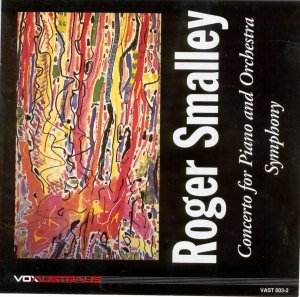You remember Roger Smalley, don't you? If you were
listening to BBC Radio 3 or had access to off-air tapes in the 1960s
and 1970s you will have known him as a practitioner of the wilder avant-garde.
He worked closely with Tim Souster especially in the
field of electronic music. Souster and Smalley formed Intermodulation
an ensemble realising electronic scores and toured throughout the UK
from 1969 until 1976. He made common cause with Stockhausen and gave
the UK premiere of his piano pieces. Sadly he does not have a place
in Mark Morris's 'Dictionary of Twentieth Century Composers'.
Like Roger Woodward (he of the wild starburst of hair)
Smalley left the UK for Australia in the 1976 just as the sun began
to rise on the traditional tonal music which Smalley has so condemned.
He was born in Swinton and was a pupil at Lee Grammar School (where,
as Francis Routh reminds us, Peter Maxwell Davies had been a pupil).
Music and science were natural companions in his studies. His composition
teacher at the RCM was Peter Racine Fricker. When Fricker left for California
Smalley continued his studies with that prolific progenitor of piano
sonatas, John White. Darmstadt and Stockhausen's Köln were among
his early stamping grounds.
The two works on this disc are in a single movement
though with divisions that are apparent to varying degrees. They lack
any electronic element apart from the tactful electronic organ in the
Symphony. They are both avant-garde and with a strong atonal element.
There is some recognisable heroic material especially in the Piano Concerto
as well as a touch of the macabre in the Symphony which I recall created
quite a stir at the time of its 1982 Downes-conducted Prom premiere
in the Royal Albert Hall. People were somewhat surprised that Smalley
should have written a symphony. The piece began as a string quartet
in Feb 1979 and was an elaboration of his two piano piece Accord
(1976). He completed the piece 1981 after a Prom commission from the
BBC.
Let it be said straightaway: the Piano Concerto
is an extremely exciting and cogent piece of writing. The work is alive
with barbed and thunderous life: gawky and pugnacious with explosive,
hammered rhythms. Stravinsky and Prokofiev are clearly shaping influences.
There is much terracing of dynamic extremes with harrying, creeping
and slithering strings. This is music not in thrall to tonality but
then neither is it as desiccated as say the Piano Concerto by Elliot
Carter - which is amongst the toughest of challenges and one from which
I have turned away (hear the Jacob Lateiner RCA LP from the 1960s).
Lovely textures squirm, slide and fluctuate slowly and fast. This is
as rich with allusion as Messiaen's Couleurs de la Cité Celeste
and Turangalila. After 18 minutes of exuberance the orchestra
bows away and leaves the piano alone to muse in a quiet and consonant
dream. The piano then rushes in a syncopated and jazzy (20.50) moto
pepetuo with gruff brassy barks and bells. The pianist lays about
him as he goes.
The Symphony is much more rugged going requiring
the aural-mental equivalent of an all-terrain vehicle to get any hold
on the grand span. It is not as directly exciting a work as the Concerto.
Its origins partly as a memorial to Pauline Steele (the dedicatee, who
died of cancer at the age of 32) may explain this. The two segments
which make up the piece comprise a sequence of eight large-scale development
sections (the composer's description) followed by a theme and 12 variations
incorporating a capering plague dance at 16.19 and an eruptive sea storm
at 24.10. The piece plays out with a solo cello, the instrument of Gregory
Baron, the close friend and companion of Pauline Steele. Baron is the
founder of the West Australian String Quartet.
The recording is of vivid colours variously shrill,
strident, refined and whisper-tender. Award-winning stuff - especially
the Concerto.
The five pages of English-only notes are by the composer.
The two works are each allocated a single track.
Recommended for those with stiffened sinews.
Rob Barnett
AVAILABILITY
This disc can be ordered from the Australian Music
Centre
Phone +61 2 9247 4677
Fax +61 2 9241 2873
Info@amcoz.com.au
www.amcoz.com.au

![]() Roger Smalley (piano)/West
Australian SO/Diego Masson
Roger Smalley (piano)/West
Australian SO/Diego Masson ![]() Symphony (1981)
Symphony (1981)
![]() VOX AUSTRALIS VAST 003-2
[57.10]
VOX AUSTRALIS VAST 003-2
[57.10]